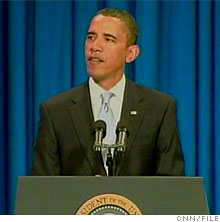Obama: 'Learn lessons of Lehman'
In speech on Wall Street, president says bailouts are working and economy is stabilizing, but regulatory reform is needed to prevent future collapses.
 |
| President Obama, in a speech on Wall Street Monday afternoon, pledged regulatory reform. |
NEW YORK (CNNMoney.com) -- The bailouts have largely stabilized the financial system, but regulatory reform is needed to prevent a similar crisis from happening again, said President Obama in a speech delivered Monday on Wall Street.
Marking the anniversary of the Lehman Brothers collapse, which set off a series of events that led to last fall's financial crisis, Obama cautioned Wall Street to step lightly as the economy and financial sector recover.
"Normalcy cannot lead to complacency," Obama said. "Unfortunately, there are some in the financial industry who are misreading this moment. Instead of learning the lessons of Lehman and the crisis from which we are still recovering, they are choosing to ignore them."
"They do so not just at their own peril, but at our nation's," the president added.
Step up regulation. Economists said the president offered no new proposals, but instead used the bully pulpit to get Congress and regulators on board.
Lawmakers and some regulators have been resistant to some of the changes the administration has proposed. For instance, Federal Reserve Chairman Ben Bernanke has opposed a new consumer regulator, arguing that it's the Fed's job to protect consumers.
"The president needs to create enough of a groundswell to get this done," said Dan Seiver, professor of finance at San Diego State University. "Right now he's encountering resistance from regulators like the Fed .. but they were the ones asleep at the switch."
Obama said much more work is left to be done. The president called for more stringent rules to prevent the domino-effect if one large firm collapses. He said an overhaul of regulation must be done in a way that does not smother innovation, but "the old ways that led to this crisis cannot stand."
"We will not go back to the days of reckless behavior and unchecked excess at the heart of this crisis, where too many were motivated only by the appetite for quick kills and bloated bonuses," he said. "Those on Wall Street cannot resume taking risks without regard for consequences, and expect that next time, American taxpayers will be there to break their fall."
Obama reiterated a number of proposals that the administration has previously made, including a new Consumer Financial Protection Agency, closing loopholes and gaps in the regulatory system, and putting an end to "too big to fail" by creating resolution authority for non-bank financial institutions. Obama also called on foreign economies to join the United States in its regulatory effort for a coordinated response to the financial crisis.
"Restoring a willingness to take responsibility -- even when it is hard -- is at the heart of what we must do," said Obama. "Here on Wall Street, you have a responsibility. The reforms I've laid out will pass and these changes will become law. But one of the most important ways to rebuild the system stronger than before is to rebuild trust stronger than before -- and you do not have to wait for a new law to do that."
Bailout era not over. "Although I will never be satisfied while people are out of work and our financial system is weakened, we can be confident that the storms of the past two years are beginning to break," said Obama. "In fact, while there continues to be a need for government involvement to stabilize the financial system, that necessity is waning."
Taxpayers have lent hundreds of billions of dollars to systemically significant financial institutions and trillions more in lending programs aimed at easing the tight grip on lending. Obama said bailout money is flowing back to taxpayers, but "that doesn't mean taxpayers will escape the worst financial crisis in decades unscathed," he said. ![]()




